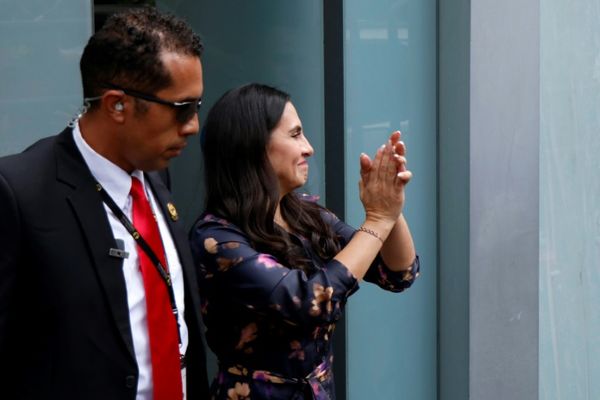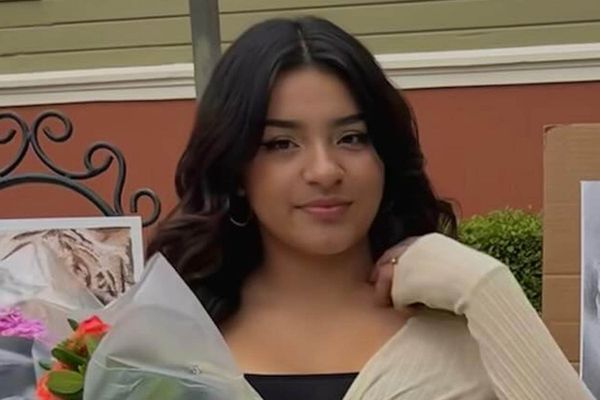After the accident, Brette Harrington didn't know if she'd ever return to the mountains. She just wanted to disappear.
Before that day in 2018, when her boyfriend Marc-André Leclerc was fatally swept away by an avalanche, they had talked about a worst-case scenario.
It was a necessary evil they'd had to imagine, given the risks they took scaling snowy peaks in the remote wilderness, often without ropes to stop a fall. This was how they'd fallen in love. Leclerc, a freakishly accomplished young alpinist, taught Harrington — previously a rock climber — how to traverse dangerously unpredictable terrain.
And he was always clear: If he died, he wanted Harrington to keep climbing.
She wasn't there when it happened, but she worried that revisiting routes they'd ascended together would only compound her grief. And at first, it did; she saw Leclerc everywhere. But then, the mountains became the only place she could be: "Climbing like that is so intense that it pulls you out of the headspace that you're in," Harrington recalled. "Almost like a survival instinct. I used climbing to escape the pain."
Which is why now, nearly four years after the death of her partner, Harrington is struggling with the release of "The Alpinist." The documentary, which is now playing in theaters with plans to expand in the coming weeks, tells the story of Leclerc's life and death at age 25. Like 2018's Oscar-winning "Free Solo," the film focuses on a twentysomething preternaturally gifted climber with high fear tolerance. Alex Honnold, the star of "Free Solo," actually knew Leclerc and is in "The Alpinist," describing his own adventures — like getting up Yosemite's 3,000-foot El Capitan rock wall using only his hands and feet — as "safe" compared to his late friend's.
A romantic partnership is also central to both men's stories. In "Free Solo," Honnold wrestled with continuing to test the limits as he embarked on a new relationship with a woman who wanted marriage and kids. In "The Alpinist," Leclerc explored the outdoors alongside Harrington, their shared passion for the sport deepening their romance.
Accordingly, Harrington — now 29 — is a big part of the movie. The documentary, co-directed by Peter Mortimer and Nick Rosen, began filming six years ago. It was supposed to premiere at SXSW in March 2020 — then at the Telluride Film Festival later that year — but both events were canceled due to COVID-19. In the interim, Harrington said she's slowly started to process Leclerc's death. She's even dated a couple of guys, though nothing serious. So watching the film has brought her back to an emotional space she isn't sure she wants to return to.
"There's been this strange delay with the movie, and now it's all pulling me back into the past," said Harrington, FaceTiming outside from Sun Valley, Idaho, where she was on a climbing trip. "It's so hard to watch the film. I just cry because it's so sad and because I usually don't force myself into thinking about him."
Leclerc and Harrington had been dating for about two years when filmmakers approached them about being a part of "The Alpinist." They met in 2012, when Harrington was a novice climber. She'd grown up skiing at a boarding school in New Hampshire but transitioned to climbing after breaking her neck at 20. While in college in Vancouver, she'd travel the 45 minutes to Squamish — a famous British Columbia climbing spot — to explore the rocks.
She was looking for a climbing partner, and a friend suggested Leclerc. With a mop of brown curls, Leclerc was a zen Canadian who'd grown up reading the work of alpinists like Reinhold Messner, the first person to ascend Everest without supplemental oxygen. Unlike his peers who relished posting mountaintop selfies on Instagram, Leclerc barely shared his adventures online. He was known for playing Enya on his headphones while in the mountains. Once, he took six tabs of acid and vanished for a few days. Oh, and when Harrington met him, he was paying $180 a month to live in a buddy's stairwell.
"I have this vivid memory of first meeting him in Squamish, coming out of the woods, barefoot with no shirt on," remembered Honnold. "He had just climbed this big wall by himself. I thought: 'What a stud, coming out of the forest. Technically, I might be able to do the things he does, but I'll never be that cool.'"
That was the sentiment Harrington arrived at too. After about a year of climbing together, he won her over. She liked that he made her laugh, and their visions about the outdoors aligned.
"He understood my headspace and abilities really well, and I his, so we knew what each other was capable of," Harrington said. "There was this unspoken connection, where he knew what was too much for me. We didn't need to talk all the time. We were just really in sync, I guess."
While the pair often explored the mountains together, Leclerc still went off on his own for solo excursions. And despite his aversion to social media — and his lack of a major sponsor — word about his abilities was spreading through the climbing community.
Mortimer and Rosen, two friends who'd met at Colorado College and later started a production company together, got wind of some of these feats in 2015. Leclerc had just soloed two major routes on Cerro Torre and Torre Egger in the Southern Patagonian Ice Field. The directors — known for creating the Reel Rock Film Tour, a traveling festival that showcases movies about adventures in the outdoors — wanted to talk to Leclerc about the possibility of filming him. But he didn't have a cellphone. So they got in touch with Harrington, who did have one, and arranged a visit to Squamish.
At the time, Leclerc and Harrington were living in a tent with her dog, Goya. Mortimer flew from his home in Boulder, Colo., and met the couple at their temporary abode in the mossy forest. There, they spent a few days skiing and discussing the idea of participating in a documentary. Though he wasn't particularly keen on accommodating a film shoot schedule, Leclerc liked the idea that the footage might reach aspiring young climbers.
"He thought alpinism and climbing should be done in a certain way, and he was hoping to inspire folks like him," explained Rosen. "Climbing is a really deeply philosophical sport for a lot of people. The way you climb and the approach that you take is kind of pivotal. You could do it with the help of a hundred sherpas and thick ropes that you could just climb up. You could do it on a well-beaten path. Or you could go to something that nobody has ever done that's quite treacherous and unpredictable and just rely on your own. And Marc really felt like a paragon of a very old-school, maybe incredibly lost approach to alpinism — this real commitment to the idea of adventure."
Leclerc had primarily been making ends meet by picking up landscaping gigs when he wasn't climbing. But shortly before he met the filmmakers, he'd gotten a contract with Arc'teryx, a Canadian outdoor gear company. And he "really had conflict about that," said Mortimer.
"Growing up in Squamish, there's an ethic there among some of the real traditional tough guys that you go and pound nails during the day to make your living, and then you go out and climb," he continued. "There's something pure about climbing, like it's too special to be paid for."
It should not have been surprising, perhaps, that Leclerc proved an elusive film subject. If he had a plan for a big climb, he only told the directors about it after the fact. They purchased a satellite phone for him, but he never turned it on.
"Marc had this vision and these things he wanted to do, and he was so good at keeping the clutter out," Mortimer said.
"And we were the clutter," Rosen added with a laugh.
Part of the reason Leclerc had been able to stay relatively under the radar, the filmmakers said, was because of the mysterious nature of alpinism. While rock climbing has a tangible rating system, the method used to rank mountain climbs is less specific. Unlike the rock wall at the center of "Free Solo" — easily viewable to National Park visitors — the peaks Leclerc climbed were secluded.
"Rock climbing is very stable, and ice climbing is incredibly unstable," said Honnold. "Within a span of hours, something can go from completely solid to completely liquid. You can hear the running water underneath what you're climbing, which is incredibly unnerving. There's a lot of uncertainty, and you have to use ice tools and crampons and you're really cold."
There were times when that uncertainty would overwhelm Harrington. Once, when she was on a mountain in Argentina, she watched a serac collapse on nearby Torre Egger, creating a powder cloud that overtook the glacier. Leclerc was planning on visiting Torre Egger soon, on a route that would take him directly below the active serac.
"I was pretty worried about that, and kept telling him to avoid the serac," said Harrington. "Later, when he was going to go back, he almost canceled his trip. But I knew he would regret it. He really didn't want to go … At that point, we were really, really connected and it was hard to spend time apart."
Indeed, the footage of the couple in the film epitomizes early twenties love. After just a few hours apart, they declare how much they miss one another. When Leclerc finally does return to Torre Egger — and successfully completes the serac-covered route — he films a video for her telling her when he's out in the mountains alone, there's a part of him that wants to rappel down and return to her.
"You know when you see people who are like, really, really into each other and you wonder: 'Can people really be that into each other? Is that a thing?' That was them," said Honnold. "What I think is remarkable about Marc-André and Brette's relationship was that in periods of great stress, they were able to be great romantic partners. That's not necessarily where you want to be with your girlfriend. I don't know if I could handle a romantic partner with the same risk tolerance."
Since the completion of "Free Solo," Honnold and his girlfriend from the film, Sanni McCandless, got married and are expecting a child in February. Even so, McCandless has been open about how difficult it was to see her relationship depicted on screen — opening herself up to the judgment of viewers who criticized her personal decisions. Honnold surmises the release of "The Alpinist" may be even more challenging for Harrington.
"It's relatively painful memories, and to be permanently tied to Marc-André — it seems like it would be harder for her to move on with her life, in certain ways," he said. "I'm sure she takes some pride in seeing a great tribute to him. But the thing with me and Sanni is that we got to end up together."
Leclerc died in March 2018 after climbing a first ascent outside Juneau, Alaska, with a local named Ryan Johnson. He didn't die "doing something crazy," said Mortimer. "He was descending the way hundreds of climbers every day on different mountains descend. They were a few hundred feet from the base camp where they had left their stuff" when they were struck by an avalanche.
The filmmakers were in the midst of post-production when Leclerc went missing, and they flew up to Alaska sans cameras to join the search when they got the news. They spent the next year and a half reshaping the narrative, returning to film with Harrington for a final interview in August 2019.
"We were with them for so much of our relationship, and then Marc died and they went silent also," she said. "So when they got back in touch and said they wanted to film with me, I was like, 'Yes! Please come visit me! I'm so lonely.' I was trying to do anything I could to try to bring back my life with Marc."
Harrington said she and Leclerc had talked about marriage — about "just being old together." Neither of them were particularly into the idea of a wedding, but he said his mom would like it. She's had trouble connecting with new men because none of them have been able to engage in all of the activities she did with Leclerc: ice climbing, rock climbing, big wall climbing, skiing.
"And then I think: I don't even know if I want that, because that's what me and Marc did together," she said, laughing at the contradiction. "I'm kind of seeing someone right now, and he's not into alpine climbing at all. He's like: 'It's just dangerous hiking in the mountains.' I'm like, 'No, it's not just that.' But I can't really describe that to someone who's not done it and doesn't have the experience or motivation."
Harrington is now sponsored by North Face, and she hopes they'll fund a climb she wants to do on El Capitan this year. She spends all of her time on the road — the next six months will be spent between the Canadian Rockies, Las Vegas, California and Chile — and keeps her stuff in storage lockers. Even though she finds herself thinking about Leclerc less, she also feels like he'll always be a part of her.
"Sometimes I catch myself doing things that I feel like he'd do, or I can recognize a climbing move that I feel like he'd be proud of. We formed each other, in a way," she said. "I don't think I really want to love anyone for the time being. I loved Marc so much. I didn't even know you could love someone that much."







